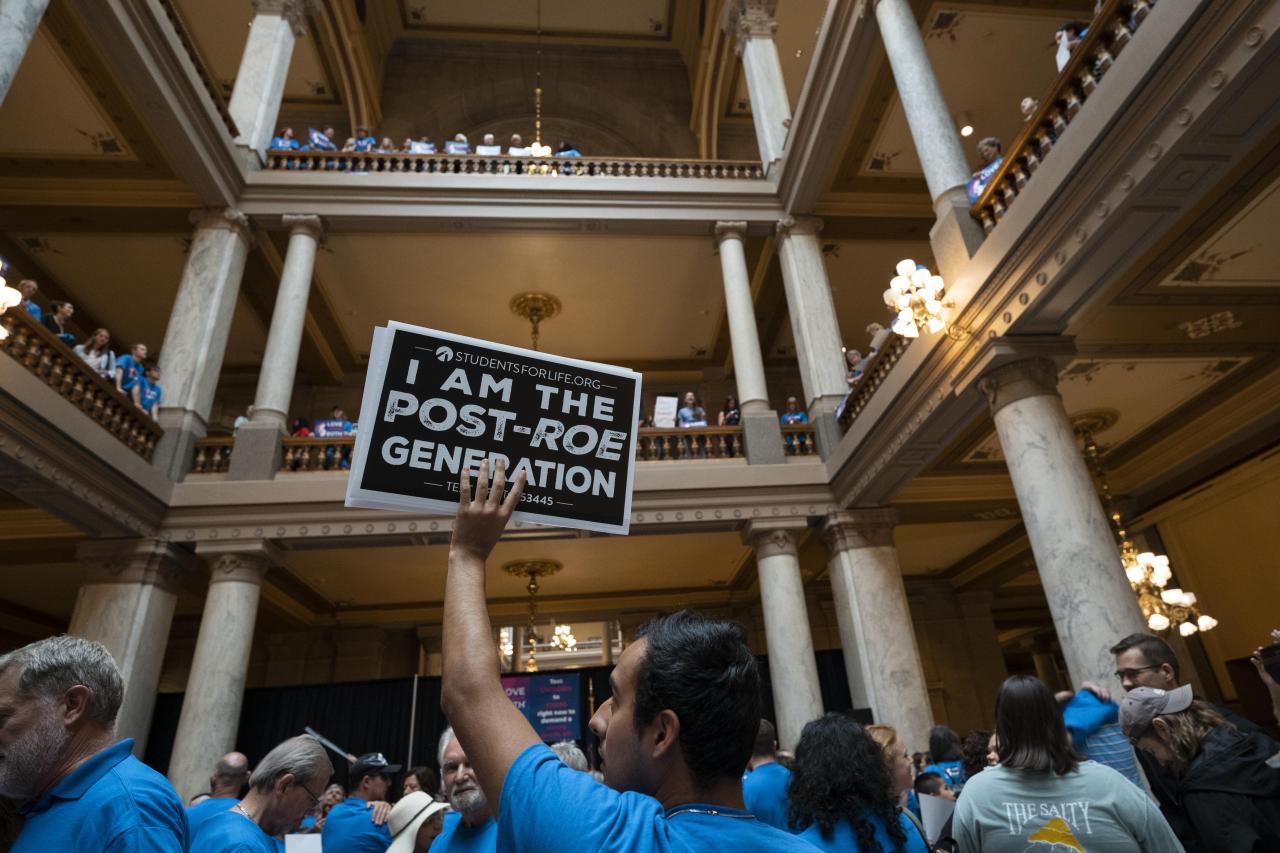Anti-abortion demonstrators protest during a special session of the Indiana State Senate at the Capitol building in Indianapolis, July 26, 2022. (Cheney Orr/Bloomberg via Getty Images)
The Supreme Court’s decision to overturn Roe v. Wade this summer unleashed a wave of anger at the GOP and lawmakers who’ve been pushing to ban abortion for years.
It also unleashed some of the most unhinged takes on pregnancy, abortion, and how uteruses function that we’ve seen in quite some time.
Advertisement
Despite the fact that conservatives fought for decades for the decision they finally achieved in Dobbs, many Republican officials have struggled mightily to rationalize their abortion stances to constituents, many of whom are experiencing an America without Roe v. Wade for the first time.
During that time, state lawmakers have opined that women can control just exactly when men ejaculate and that child rape victims have “options” that aren’t abortion, while gubernatorial candidates and actual members of Congress explicitly comparing abortion with genocide.
Child rape victims have “options,” like Plan B
During a late August hearing, South Carolina House legislators debated a complete ban on abortion. While lawmakers ultimately included exceptions for rape and incest in their proposed abortion ban, Republican Rep. Doug Gillam complained about characterizing a child rape victim as being “forced” to carry her rapist’s baby, and suggested that such victims have “options” such as Plan B.
When asked by a fellow Republican who would drive the child to Walmart to get the morning after pill, he replied: “The ambulance. The hospital when she’s there.”
Advertisement
Gillam ultimately voted for the bill, which passed the state House with exceptions for rape and incest. By early September, however, a Senate committee voted to strip those exceptions out of the bill.
Although exceptions for rape and incest survivors used to be a routine component of abortion legislation, those exceptions have started to disappear from modern-day restrictions, even though polls show that most Americans continue to support them.
“Many anti-abortion activists never believed that a rape or incest exception could be squared with their deeply held belief that a fetus is a person,” scholars Michele Goodwin and Mary Ziegler wrote in The Atlantic last November. “Today the anti-abortion movement is ready to ask for what it wants, and the GOP—and its allies on the Supreme Court—is willing to give it to them.”
Women can control when men ejaculate
On the same day that the Dobbs decision came down, Utah state Rep. Karianne Lisonbee said during a press conference that she’d gotten a text message from someone implying that she “clearly doesn’t trust women enough to make choices to control their own body.”
“My response is I do trust women enough to control when they allow a man to ejaculate inside of them and to control that intake of semen,” Lisonbee said. She later walked back the statement, acknowledging, “Women do not have a choice when they are raped and have protections under Utah’s trigger law.”
Advertisement
Utah passed a “trigger” ban on abortion except to save the life of the mother and in cases of rape and incest—but only if those cases are reported to the police. A federal judge blocked implementation of the ban in July.
The womb is for babies (and nothing else)
In July, Brad Tschida—a former Montana state House leader now running for state Senate—said in an email to fellow legislators that the “womb is the only organ in a woman’s body that serves no specific purpose to her life or well-being.”
This is, of course, incredibly wrong. “It is truly a sanctuary,” Tschida said in the email. Tschida told MTN News later: “I think that’s exactly what it’s there for. It welcomes in a new life and that’s what it’s there to do, to nurture and sustain that life.”
Obligatory Holocaust and genocide comparisons
During a Sunday interview with Fox News, Rep. Tom Emmer of Minnesota—the chair of the National Republican Campaign Committee, the campaign arm of the House GOP—referred to an attempt to codify abortion rights into federal law as the “Chinese genocide bill.”
Comparing the bill to China’s former One Child policy, Emmer falsely claimed that the Women’s Health Protection Act passed by the House this year “would allow abortion up to moments before a child takes its first breath.”
Advertisement
The bill actually says that state and local governments would be barred from “prohibiting” abortion services before fetal viability, which tends to occur around 24 weeks of pregnancy, or after fetal viability when a provider determines the pregnancy risks the patient’s life or health.
Comments made by Illinois Republican gubernatorial nominee Darren Bailey have also resurfaced following the Dobbs decision. In 2017, Bailey said in a podcast interview that the “attempted extermination of the Jews of World War II doesn’t even compare on a shadow of the life that has been lost with abortion since its legalization,” according to Forward.
Bailey attempted to backtrack when confronted with the comments last month, telling Forward that the “Holocaust is a human tragedy without parallel,” but also that he only used the comparison “to emphasize the tragedy of millions of babies being lost.” So, just a genocide of “babies.”
Abortion opponents often compare abortion to the Holocaust. Now that Roe has been overturned, that comparison has even been enshrined in law: An abortion ban in Alabama, for example, reads, “More than 50 million babies have been aborted in
the United States since the Roe decision in 1973, more than three times the number who were killed in German death camps, Chinese purges, Stalin’s gulags, Cambodian killing fields, and the Rwandan genocide combined.”
The United States Holocaust Memorial Museum has repeatedly rejected any kind of attempt to analogize the Holocaust to, well, anything else.
Carter Sherman contributed reporting.
Want the best of VICE News straight to your inbox? Sign up here.
Related posts:
Views: 0
 RSS Feed
RSS Feed

















 September 8th, 2022
September 8th, 2022  Awake Goy
Awake Goy 
 Posted in
Posted in  Tags:
Tags: 
















